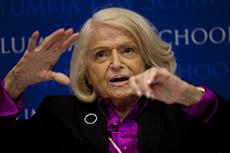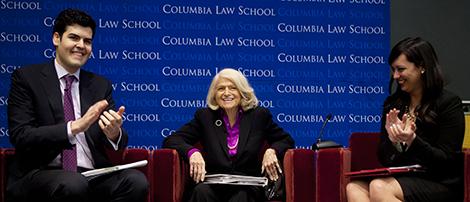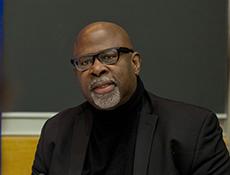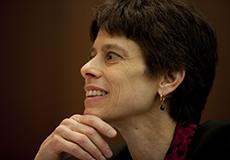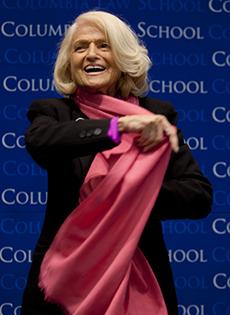Wins, Losses, and Love
Columbia Law School's Center for Gender and Sexuality Law honored DOMA plaintiff Edith Windsor as part of a symposium featuring leading advocates in the legal and political fight for marriage equality and reproductive rights.
New York, March 5, 2014—Before the U.S. Supreme Court heard arguments in the landmark U.S. v. Windsor case challenging the federal Defense of Marriage Act (DOMA) last year, a member of Edith Windsor’s legal team gave the octogenarian plaintiff an easy out.
| Edith Windsor |
“They said, ‘You can quit now,’” Windsor recalled for a standing room only crowd of Columbia Law School students, faculty, and guests at a Feb. 28 symposium on the battles for marriage equality and reproductive rights. “They told me the lower court ruling would stand and DOMA would be unconstitutional ‘as applied to me.’”
Windsor, dazzling in a purple shirt and dark suit with the diamond circle pin that served as her engagement ring from her late longtime partner and eventual wife Thea Spyer on her right lapel, took a breath.
“And I said, ‘We’re going to the Supreme Court,’” she said. “There was no way I could say to anyone else ‘I won, and you lost’ and call that a win.”
Windsor was the guest of honor at the symposium, which was presented by the Center for Gender and Sexuality Law as part of the Law School’s 64@50 series in honor of the 50th anniversary of the Civil Rights Act, and included two morning panels with leading litigators and activists. View an interactive timeline of significant LGBTQ and reproductive rights events.
Vice Dean and Stanley H. Fuld Professor of Law Gillian E. Metzger got the day started with introductory remarks noting the sense of urgency surrounding LGBT and reproductive rights and the significant contributions of Columbia Law School Professor Suzanne B. Goldberg, co-director of the Center for Gender and Sexuality Law and the Herbert and Doris Wechsler Clinical Professor of Law.
Goldberg gave all credit to the panelists, whom she said she learns from every day. She called Windsor, a former IBM computer programmer who dared to sue the U.S. government after receiving a $363,053 tax bill following Spyer’s death, a “rock star.”
“It’s not often that a law school gets to welcome a rock star,” said Goldberg. “But, in our world, Edie Windsor is a rock star. She’s one of the major civil rights plaintiffs in our lifetime.”
Windsor spoke for more than an hour in conversation with Goldberg and two Columbia Law School students, Andrew Chesley ’16 and Madeline Gomez ’15. Her comments were an inspiring finish to a morning of insightful analysis and reflection from some of the biggest names in the legal and political fight for LGBT equality and access to reproductive health care for women.
| Edith Windsor with Andrew Chesley '16 and Madeline Gomez '15 |
Courtroom Battles
In the first panel, “Litigating the Cases: DOMA Undone; Marriage and Abortion Access Battles Ahead,” Columbia Law School Nash Professor of Law Kendall Thomas moderated a discussion among Brigitte Amiri, senior staff attorney at the ACLU’s Reproductive Freedom Project; Mary Bonauto, civil rights project director at Gay and Lesbian Advocates and Defenders; James Esseks, director of the ACLU’s LGBT and AIDS Project; and Bebe Anderson, director of the Center for Reproductive Rights U.S. Legal Program.
The panelists spoke about pending religious liberty challenges to the Affordable Care Act’s mandatory contraceptive coverage, strategies in abortion access cases across the country, and the task of preparing a favorable climate for civil justice litigation.
| Professor Kendall Thomas |
Bonauto, who won the first courtroom battles for marriage equality in Massachusetts and brought one of the original challenges to DOMA, said she had to turn away couples who wanted to litigate their right to marry in the early years of her career.
“Being right is not enough,” she said. “There’s so much to do to move the culture and the law in a way that people can meaningfully engage with the issues.”
Amiri addressed the difficulties in challenging the recent onslaught of restrictions against abortion, especially because of the stigma women face if they admit to having had an abortion and because of the increasing use of religion as justification for denying reproductive care.
“The point about whether religion should trump reproductive rights comes up all the time,” she said, adding that opponents’ use of religion is an obstacle reproductive rights advocates share with the LGBT community. “Religion has been used to discriminate against entire classes of people.”
Advocacy in the Community
The second panel of the day, “Advocacy Outside the Courtroom: Legislative, Media, and Community Advances and Challenges,” was moderated by Goldberg and featured Jessica González-Rojas, executive director of the National Latina Institute for Reproductive Health; Sharon McGowan, deputy general counsel for policy for the U.S. Office of Personnel Management; Hilary Rosen, a managing director for communications firm
SKDKnickerbocker; Heather Sawyer, minority counsel for the House Judiciary Committee; Rachel Sussman, director of state policy and advocacy, Planned Parenthood Federation of America; and Evan Wolfson, founder and president of Freedom to Marry.
| Professor Suzanne B. Goldberg |
McGowan, speaking in her personal capacity, said it had been an honor to work in the Department of Justice under U.S. Attorney General and Columbia Law School alumnus Eric H. Holder, Jr. ’76 and as his government partner in implementing benefits for gay couples in the Office of Personnel Management.
“He is one of the most important figures in the shift” the federal government has made toward recognizing same-sex relationships, including in refusing to defend DOMA, she said.
Most of the panelists and people in attendance at the symposium have been working together for decades in the quest for equality and justice and will continue to do so, Wolfson said.
“The undeniable reality is that the work of social justice and inclusion is never done,” he said. “No one person is going to be able to do something this big. That’s just not how social justice works.”
As an example of the continued challenges, he pointed to Arizona Governor Jan Brewer’s veto of legislation that would have allowed businesses to use religion as a basis for discriminating against gays and lesbians. Such defensive victories are necessary, he said, but should not be the main goal of a movement.
“It’s no longer that we want to be let alone,” he said. “We want to be let in. Waking up alive is good, but you want more out of your day. We have to know what is our vision for the country and how are we going to persuade people to rally around it.”
‘Legal Dream Team’
| Windsor wearing a pink scarf from an audience member in an impromptu reenactment of a photo taken of her outside the U.S. Supreme Court the day her case was argued. |
Windsor closed the day with an exuberant recap of her experience as the plaintiff behind the case that took down DOMA, cutting off questions mid-stream to tell the story of her life with colorful vignettes, including her first visit to a lesbian bar in the 1960s, before she met Spyer.
“I sat down at the bar and I bought a drink—I’d never paid for a drink myself before in my life—and I sat there for two hours and nobody talked to me,” she recalled to the audience’s delight. “I was dressed to a T, and I thought, this is going to be hard.”
On the other hand, being a plaintiff was easy, she said.
“We were a perfect fit,” she said of lead counsel Roberta A. Kaplan ’91, a Columbia Law School graduate. Together with Esseks and other attorneys, including from Kaplan’s firm Paul, Weiss, Rifkind, Wharton & Garrison, the litigators were “a legal dream team,” Windsor said.
One enthralled audience member asked Windsor how she stays so happy.
Windsor said the gay community has been a haven. When she was younger, she recalled, she had tried to disassociate herself from the “queens and dykes.”
“But those queens and dykes changed my life at Stonewall,” she said. “For me that was the beginning of a sense of community.”
She described the dignity that people acquired as they came out of the closet with the success of the DOMA litigation, including her own case.
“I live in a loving and joyous community,” Windsor said. “And you can’t beat it for a way to live.”
